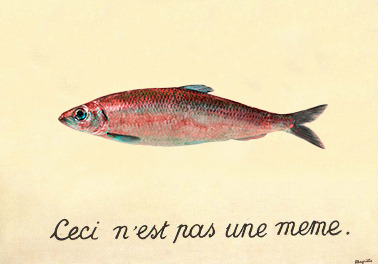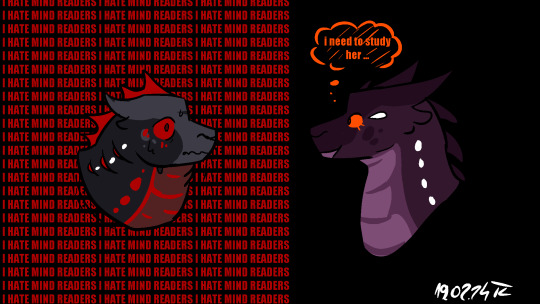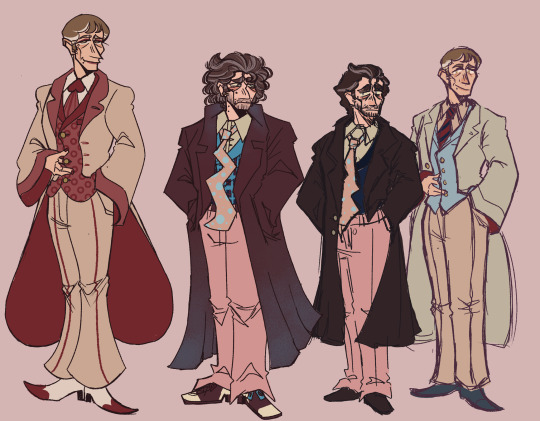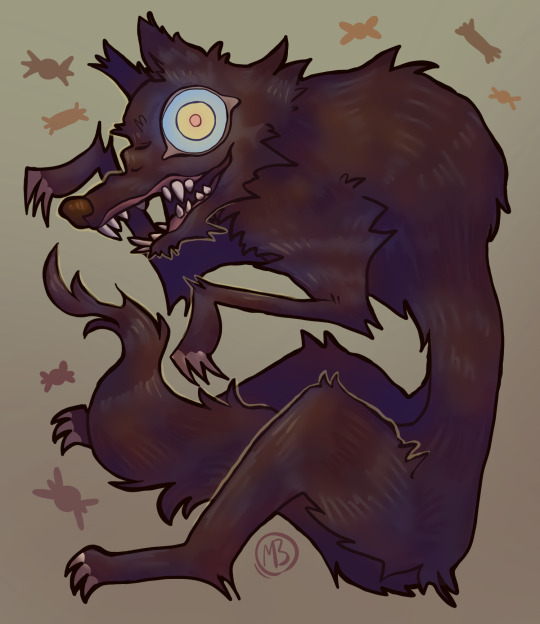#red herring
Text

#thank you to @bisexualvalve for the commission!#red herring#herring#the treachery of images#rene magritte#original coast
3K notes
·
View notes
Text
What is... a red herring?
A red herring symbolises a diversion tactic. It's a literary device that is used to distract the reader and lead them to a false conclusion.
Mostly used intentionally, especially in crime stories, it can also be used unintentionally. In crime and adventure stories this element is one of the most important ones to set the reader on the wrong track and keep up the suspense.
The name comes from the actual strong-smelling fish that was supposed to divert the hounds when hunting.
#what is wednesday#red herring#literary#writing advice#writing tips#writeblr#writing#writers on tumblr
822 notes
·
View notes
Text

👀.
195 notes
·
View notes
Text

just striking a cool pose while catching some fish, as you do 🎣
art by TheoPoesis on DA
#red herring#my oc#mlp#my little pony#mlpfim#my little pony friendship is magic#mlp:fim#oc#mlp oc#gingerverse#art for me
96 notes
·
View notes
Text


33 notes
·
View notes
Text
Why Writers Use Red Herrings
If a teacher has ever tried to explain an English reading assignment to you before, they’ve likely called something a red herring. Google that term and you’ll see a fish. It’s also a term for a literary device.
These are a few things you should know to use them in your stories.
What Is a Red Herring?
The term “red herring” first appeared only in conversations. People used it to describe a herring fish split lengthwise down the middle (kippered) because it smelled extra bad and looked red. They also called a fish a red herring if it was cooked a certain way because the final dish also had a strong smell while retaining some red coloring.
Literary experts note that it appeared in the written word first in an early 13th-century poem. It was just used to describe a red herring, which likely meant the herring was split lengthwise as well.
The first use of it being anything other than that was in 1981. Brewer's Dictionary of Phrase and Fable recorded the phrase as drawing attention away from the main issue with a secondary issue.
No one’s really sure exactly when it became a method of distraction, although there’s a long-running story that trainers teaching hunting dogs would use a literal kippered herring to draw dogs away from whatever scent they were chasing. Back in 1599, a writer mentioned this use of red herrings and praised its effectiveness.
People have generally used it as a literary term ever since.
A red herring is a plot device that distracts the reader from the actual rising action or mystery.
You don’t need one in every story. They’re mostly effective at making the reader think they’ve figured out something essential to your plot, so they’re best in mystery genres. However, there are a few times you can use them to trick and surprise your readers.
Moments to Use a Red Herring
When You Want Your Reader to “Figure Something Out”
Mystery writers have a common goal: reveal the answer to their plot’s primary mystery at the time of their choice. Readers who solve the mystery too early don’t get to savor the rest of the story as much because there’s less tension.
You can use a red herring to make the reader feel like they know where your plot is going, but it’s all a distraction. Don’t plan on writing a story no one will solve early—there will always be a few sharp readers who can put your clues together. However, you can delay the big reveal with a red herring.
Example: Your protagonist is trying to figure out who stole their bike. You introduce a side character who mentions being jealous of the bike and learns to ride after it gets stolen. The reader will think this side character is the thief, but your protagonist finds out it was their own best friend who knew the code to their garage.
When You Want the Reader to Feel Surrounded by Potential Answers
Consider your favorite mystery book, show, or movie. You probably tried to solve the mystery before it ended, but you had a handful of people that could potentially have caused the inciting incident.
That’s because the writer purposefully used multiple red herrings. It makes the reader spin in circles as they try to guess how your story will end.
You can use this option if you feel like your plot is too obvious. Multiple red herrings complicate things if your herrings have good enough reasons to potentially be the bad guy.
Example: Your protagonist’s great-grandfather is found murdered in his isolated cabin. They search for clues to find the murderer by talking with everyone who knew him. Some relatives would stand to gain from their inheritance, while others have reasons to seek revenge. Your protagonist isn’t sure who the murderer is until the last minute when the same person tries to kill them for getting too close to the truth.
When Red Herrings Don’t Work
When the Individuals Have No Motive
You wouldn’t suspect someone of a crime if they had no reason to commit it. Readers won’t try to pin a mystery on a character without a good motive. Make sure you know the specific potential motive for each red herring before writing them into your story.
When They Feel Too Obvious
The point of a red herring is to hint at a possibility. Your reader won’t guess an incorrect answer to the mystery if it’s too obvious.
Example: Your protagonist talks to their cousin to find out if they could be the one to have killed their great-grandfather. The cousin says, “Yeah, I hated his guts. I had a million reasons to kill him. Too bad it wasn’t me.”
This is too direct. The cousin is all but admitting potential guilt. In real life, the protagonist would get suspicious (encounter a literary red herring) if the cousin was shifting on their feet, not making eye contact, and responding, “We didn’t really get along much. There was some troubled history there, but I wouldn’t ever dream of hurting him.”
The words are less direct because they sound like something an innocent person would say. The body language and an indicated tone of voice make this character a red herring because it’s translating as guilt. If they continue doing things that make it seem like they feel guilty, the cousin will be a stronger red herring.
When You Don’t Know Your Overall Plot’s Direction
You won’t be able to mislead people if you can’t confidently lead them to your story’s ending. It’s crucial that you already know who your primary antagonist is before writing red-herring characters or elements. Try making a plot map or outlining your work in other genres to practice for your future mystery tales.
-----
Anyone can learn how to use red herrings by understanding what they do and when to weave them into your plot. As long as you know what your big reveal will be at the end of your story, you can use red herrings to keep your readers on their toes and help them enjoy your work more.
#red herring#literary devices#writeblr#writers of tumblr#creative writing#writing tips#writing help#writing advice#writing inspiration#writing#writing community#writing resources
108 notes
·
View notes
Text
Literary Devices Similar to Foreshadowing


There are a number of literary techniques and practices that have some overlap with foreshadowing. Here are a few to keep in mind:
1. Chekhov’s Gun: is a writing best practice often confused with foreshadowing. Russian playwright Anton Chekhov famously said, “If you say in the first chapter that there is a rifle hanging on the wall, in the second or third chapter it absolutely must go off.” The refers to the idea that every element in a story should contribute to the whole, and that every detail that “sets up” an outcome should “pay off” in some way. In the example of Chekov's Gun that could mean one character shooting another but an author may also choose to defy that expectation—say, by filling the gun with blanks.
2. Red Herring: Unlike foreshadowing, which is designed to hint at something that will happen in your story, a red herring is a literary device that is designed to mislead the reader, distracting them from the eventual twist. Red herrings are often used in mystery novels, with characters suspected of a crime turning out innocent.
3. Flashforward: The opposite of a flashback, a flashforward (also known as flash-forward or prolepsis) brings your reader forward in time for a glimpse at the future. This is different from foreshadowing, as you’re explicitly showing your readers what is to come. Stories that employ flashforwards derive their suspense not from readers wondering what will happen, but rather how it will happen.
I've actually employed this literary device personally in one of my completed books 'Vicious Fangs' on wattpad and enjoy both reading and writing it!
#writing advice#writing tips#foreshadowing#red herring#books#writers#chekov's gun#anton chekhov#flash forward#readers of tumblr#daily life#bookaddict#writers on tumblr#dank memes#reader problems#book blog#booklover
608 notes
·
View notes
Text
probably how their first meeting went (also still not sure about starchasers design. might change that later)

[id: headshots of two wings of fire ocs, red herring, a night sea hybrid, and starchaser, a nightwing. Red herring is shubby with harsh edges, has black scales with red fins, eyes, bioluminescent makings and gills. Her belly is maroon and she is slightly chubby. Starchaser has purple scales with pink belly, amber eyes with teardrop and teardrop scales and lean neck with long snout. Red is very nervous, staring off into space, while Starchaser smiles and looks at it.
Red herring has behind it as "i hate mind readers" repeating over and over again, creating a wall of text taking up half of the screen. Starchaser has an orange thought bubble with text that reads "i need to study her ..." / end id]
red herring: she/it
starchaster: he/him
#wof#wings of fire#wof oc#wings of fire oc#red herring#starchaser#eyestrain#repetition#snowart#red herring story
21 notes
·
View notes
Text
The Auspectives

One thing about me is if a game can have a detective, it will. Here’s three across three of the chronicles I play in/run
I.M D’amore - toreador, gentleman detective based in New York CittttAaay
Remington “red” herring - hardboiled noir detective and columbo kinnie based in Seattle. Sire of Harvey Darling
Renata “deadeye” Giovanni - hecata and occult detective, currently based in Salt Lake City
(Their old designs are under the break)
What Four months of improvement does to a homie

First designed them in June. Re addressed them in October. Super happy with the improvement!
#vtm#vtm art#vtm oc#vtm ocs#vampire the masquerade#vamily#toreador#malkavian#hecata#vampire: stake city#vampire: sleepless in seattle#red herring#Renata Giovanni#i.m. D’amore#vtmb#vampire: the masquerade#vampirethemasquerade#vtm malkavian#vtm giovanni#vtm toreador#character art#wod oc#mori.art.yee
48 notes
·
View notes
Text
I’ve just read The Magic Trick You Didn’t See (Good Omens theory—highly suggest a read, it’s incredible)
Holy hell. A million thanks to @ariaste for that gorgeous discourse. It made me emotional! An *essay* made me *emotional* — I’m still in awe.
Anyway, it inspired me to do a (slightly conspiratorial) rewatch. I’ve hit pause so many times already, and I’m not even past the episode one intro 💀
However I happened to notice something in the intro that made me even more sure that The Magic Trick really is onto something. The whole idea is that Neil’s been 1) pulling a “disappearing trick” throughout season two—leading us away from the truth and ultimate “payoff” via distraction and 2) hiding things in plain sight. You know what that sounds like? A red herring. And what do I find in the intro? A whole bucket of ‘em. Quite literally.

I truly believe that everything in this show—especially the intro, as beautiful as it is—is done for a reason. The attention to detail thus far has been insane (much like myself, at present), and I don’t see why that wouldn’t continue into season two. If the Magic Trick—or a similar theory—turns out to be true, you’d best believe the crew’s left clues all over the place. And I’d call this a Clue with a capital C.
#good omens#good omens season 2#good omens 2#good omens season 2 spoilers#good omens 2 spoilers#good omens spoilers#good omens 3#good omens 3 speculation#red herring#the magic trick you didn't see#the magic trick theory#ariaste theory#in the best possible way…I’m going insane :)
27 notes
·
View notes
Text

a more complete ref sheet for Red Herring, including her t-shirt and coat color pattern (since the majority of it is obscured lol)
#shes everything#red herring#gingerverse#my oc#oc#mlp oc#my art#red herring family#mlp#my little pony#mlpfim#my little pony friendship is magic#mlp:fim#ref sheet
119 notes
·
View notes
Text

Red herring
#first over the garden wall art woo!#Otgw#otgw fanart#otgw dog#red herring#the beast#but not really#candy dog#over the garden wall#over the garden wall dog#otgw art#dog otgw#my art#digital art#csp art#clip studio paint#wolf#mvshroombae
23 notes
·
View notes
Text
Miss Scarlet and the Duke: A RED HERRING of a Title
I think that title of this show doesn't mean what most people think it does. Let me begin by saying I used to be one of "most people."
When I tuned in Season 1 I made what I imagine are the same assumptions most people did:
These were the two main characters
The show's main focus was Eliza's relationship with William
They would end up together.
It is now my strong hope/belief that the third assumption is wrong. This being a mystery show, I fully support the title as being somewhat of a red herring.
Stories can be about a relationship without it meaning they spend the rest of their lives together. Tristan & Isolde comes immediately to mind. Not that I think or hope they are killing off William.
Perhaps a better example is "Wicked: The Untold Story of the Witches of Oz". The soul of the musical is about Glinda and Elfie, but they split up at the end. They each had a different, important destiny. It doesn't mean they didn't love each other or that their friendship didn't matter. "For Good" is the song I think of most for William & Eliza (at least when I'm not irritated with William. When I'm mad at William it is "King of Anything" by Sara Bareilles).
I've heard it said
That people come into our lives for a reason
Bringing something we must learn
And we are led
To those who help us most to grow
If we let them
And we help them in return
Well, I don't know if I believe that's true
But I know I'm who I am today
Because I knew you
It's an absolutely beautiful song that pays tribute to those fundamental people in our lives whose have a huge impact, even if our paths diverge. This is what I want for William and Eliza, a bittersweet ending, acknowledging the value of their history, while also acknowledging they have different destinies.
10 notes
·
View notes
Text

@bliz-lol
Hello legend. Rate this art :>
19 notes
·
View notes
Text

9 notes
·
View notes
Text
SO HEAR ME OUT
everyone’s assuming the “red herring” anagram was a reference to the fact that we thought it was going to be rep tv and it was actually a new album
BUT red herring is also the name of a literary device. and the only confirmed song title we have is “the manuscript”
what if each title is going to be a different literary device and red herring is our lead single???
10 notes
·
View notes